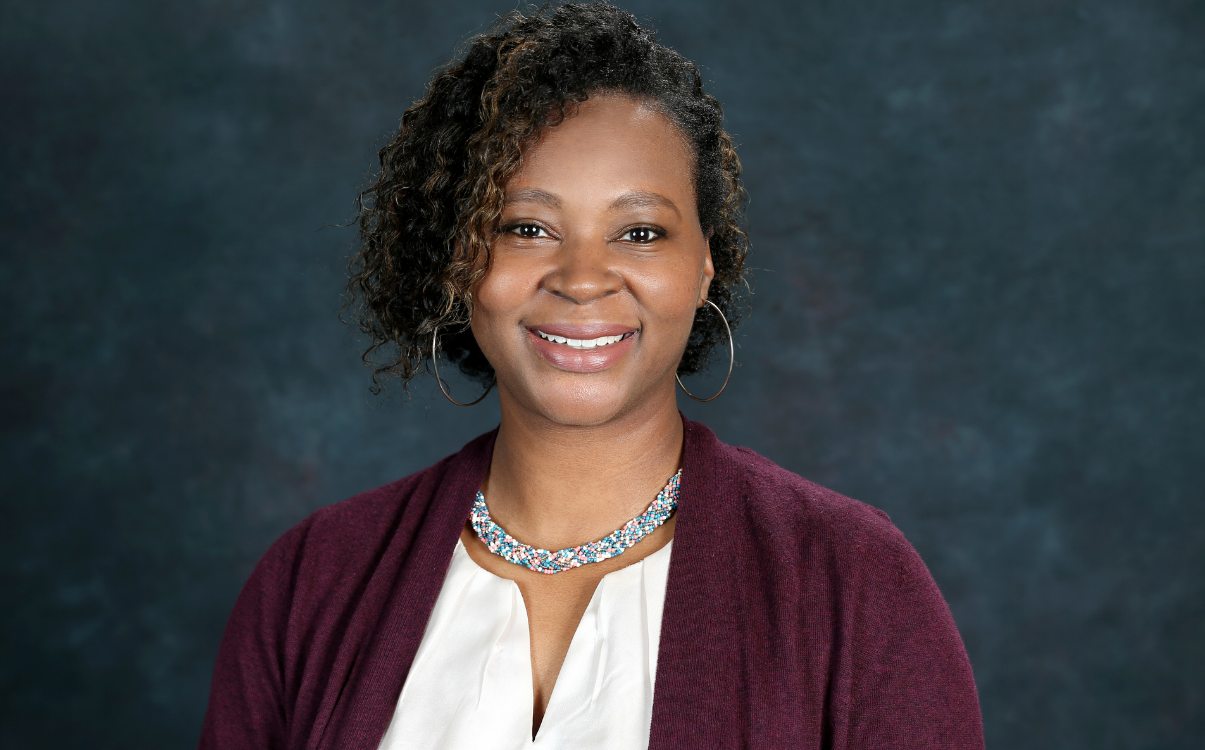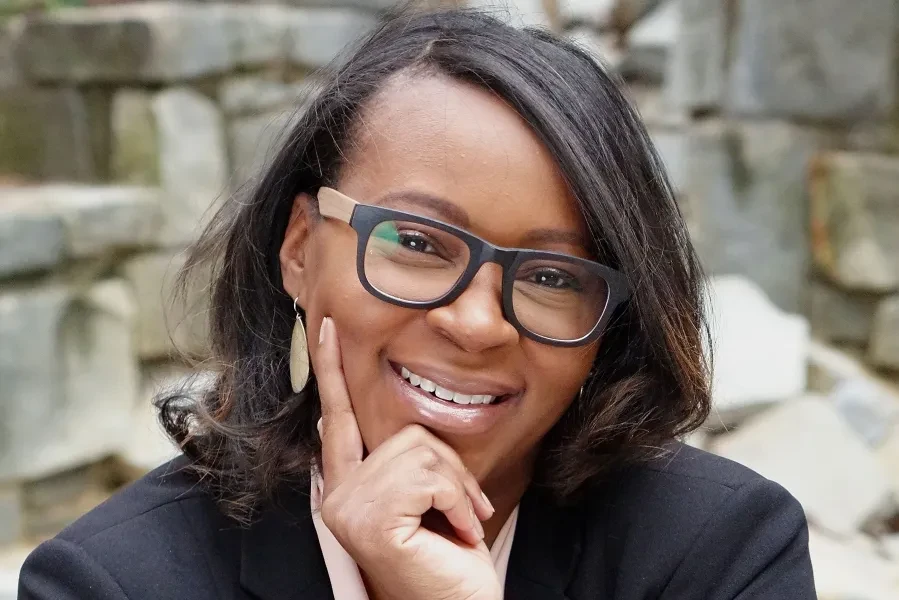The world of sports has been interwoven throughout the personal and professional pursuits of alum Dr. Angel Brutus. In high school, she was a cheerleader who also competed in softball and volleyball. While an undergrad, she worked with athletes across a wide variety of sports via her role in her university’s recruiting department.
Although she didn’t play on an athletic team in college, many of her friends who did turned to her for guidance and wisdom along the way.
“From a personal standpoint, I was always that go-to friend for peers who were also high-level competitors, people who went on to work professionally in the field of sports,” she explains.
Her knack for advising others is an ability she has harnessed and built a career upon. When it comes to this skill, she is a natural with the academic acumen to back it up.
Angel earned her BA in Audiology & Speech-Language Pathology while minoring in African & African-American Studies, and then went on to earn her Master of Science in Counseling, both from the University of Tennessee-Knoxville.
Building on this knowledge and ability, she opened a private practice as a Certified Mental Performance Consultant. There, Angel became a forerunner in the growing field of telehealth, helping her clients develop the skills needed to optimize performance and find success in their lives. She began to realize that the majority of people pursuing her services were athletes of all types and she wanted to better serve their needs.
So, with her hands full, juggling her counseling practice and three young daughters, Angel made the decision to go back to school. In 2012, she enrolled in classes to earn her Doctor of Psychology (PsyD) in Sport and Performance Psychology* at what was then the University of the Rockies (now the University of Arizona Global Campus).
Springboard for a Career
 Angel knew earning her doctorate would open the doors for new career opportunities, but her ultimate motivation was her clients’ well-being.
Angel knew earning her doctorate would open the doors for new career opportunities, but her ultimate motivation was her clients’ well-being.
“I felt the need to increase my areas of competence in working with this population to ensure that the interventions provided were appropriate and not detrimental to performance,” she explains.
Not only did she want to hit that goal, but she had another personal one in mind, one that no doubt ties back to her competitive background: To finish her doctorate within four years.
“I was always told that timeline was ambitious,” she says. “But I’m an all gas, no brakes kind of person. So, I went for it and it made sense — one for my mental sanity and two, from a financial standpoint.”
However, it wasn’t her only major life change that year. She also had recently given birth to her third daughter and going back to school with an ambitious timeline was a challenge she acknowledged and accepted.
“I was crazy enough to be one of those people who go back to school with a six-month old,” she recalls. “But I was in private practice at the time and that was a blessing. You have a lot of autonomy in what you can and can’t do.”
For other working parents and/or students looking for tips on how to fit it all in, she says knowing how to work when you’re most productive is key.
“It’s important to really identify the times of day when you have the most mental flexibility and the capacity to not only process information, but also to produce quality work in an efficient manner,” says Angel. “First, do a self-assessment on what your energy management patterns are. Time management is more about energy management. For me, that really helped to sustain the marathon of pursuing my doctorate as a virtual student in such a meaningful way.”
For Angel, that meant waking up at 4 am to work on assignments. She also squeezed in studying and responding to discussions while carpooling and during other downtimes.
Of course, she admits she may not have been able to do it all without the mentorship of UAGC lead faculty Dr. Tim Rice, who eventually served as her dissertation chair.
“At times, he saw things in me I couldn’t see in myself,” she acknowledges. “His guidance throughout my time with the institution was unmatched. I was very fortunate to have instructors and advisors who held the same values aligned with integrity, diligence, and excellence – values which I hold dear.”
Although she was hesitant to earn her doctorate online at first, her personal experience quickly showed her the many benefits.
“Initially, there was a little bit of hesitation on if there was a stigma associated with it being an online program and how others might perceive it,” says Angel. “However, for students who are part of this system, it’s time to debunk the myth that exists regarding the level of acumen academically or competency professionally that others might perceive as a decreased value because it’s an online program. That’s the furthest thing from the truth.”
For Angel, she realized the level of dedication and organization it took to successfully balance online classes and her personal life truly enhanced her skills professionally.
“You have to have a certain level of autonomy that allows you to remain efficient and still get the work done with a high level of quality. The skills have proven extremely helpful career-wise.”
A World of Opportunity
In 2016, the Golden Key National Honour Society member successfully defended her dissertation entitled “Minority, Student and Athlete: Understanding the Multiracial Division I Intercollegiate Athlete’s Ascribed Meanings of the Experience of Stereotype Threat” and earned her doctorate as one of the top graduates in the history of the PsyD program.
It was then that Angel discovered a new world of career options available to her.
“It really opened up opportunities to become eligible for positions that were being posted, particularly within the collegiate setting,” she says.
Shortly after graduating, Angel joined Mississippi State University’s Sports Medicine and Performance team, serving as Assistant Athletic Director of Counseling and Sport Psychology. There, she provides clinical and performance enhancement services to address MSU’s sports culture.
“My role now is interesting because I serve as an administrator and as a practitioner providing direct services to clients,” she explains. “So, it’s a split role. The thing I enjoy the most is really allowing the space for the athletes that I serve to be 100% themselves and not feel like they have to perform.”
On the administrator side, she enjoys playing a part in the decision-making process at the university.
“The other aspect that’s exciting is the opportunity to influence policies and procedures that have a direct impact on the student athlete experience,” she says, “as well as having an impact on the larger ecosystem that we work in.”
Angel also serves as former coordinator for the Association for Applied Sport Psychology's Race & Ethnicity in Sport Special Interest Group (SIG) and is a member of additional SIGs (Women in Sport, Eating Disorders in Sport, Adaptive Sport & Physical Activity) and a member of multiple committees within the Association of which she co-chairs the Nominations/Leadership Development and assists with Professional Ethics.
Angel emphasizes the benefit of being involved and engaged in professional organizations that house individuals within her field. She lists the Association for Applied Sports Psychology, the International Society for Sports Psychiatry, and BASES (British Association of Sport and Exercise Sciences) as top resources for connecting with likeminded professionals.
“I think it’s really important to not just be a member, but to be actively involved in those organizations,” she explains. “Those places are made up of individuals who are trailblazers within their field while also keeping you up-to-date on a lot of the contemporary approaches while not neglecting the historical or seminal approaches to the work that we do.”
Although Angel has long left behind competitive sports, her progression from an early life as an athlete to helping those who continue to wear the uniform has come to fruition.
--
Certain degree programs may not be available in all states.
*The Doctor of Psychology program is not a licensure program. The University of Arizona Global Campus cannot confirm whether its courses or programs meet requirements for professional licensure in your state. For information regarding professional licensure requirements in your state, you should contact the applicable licensing board or agency in your state and determine whether the program meets requirements for licensure in the state where you reside."
